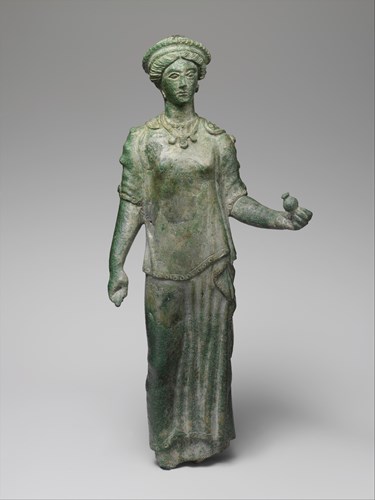The archaeological evidence suggests that initially, the rites of Demeter served the needs of an elite group of Eleusinians. The rituals could either enhance the bonds between the group members or reinforce the group’s authority over the population by controlling access to the rites. The ceremony gradually became accessible to a broader circle of people. Still, it never lost its character as a mystery, i.e. a religious tradition accessible only to those who had been initiated into the mysteries.
The Eleusinian Mysteries had a significant difference compared to other ancient Greek festivals. They were open to men and women of all ages, free and slaves, irrespective of social and economic status. According to Herodotus, “whoever of the Athenians and the other Greeks wishes is initiated”. The Mysteries may have originated as a local rite, but over the centuries, their panhellenic character became more pronounced, aided by the desire of Athens to endow the ceremony with as much majesty and significance as it could tolerate. At the height of their popularity, the Mysteries attracted prospective initiates from the far corners of the Mediterranean world. Demeter and Persephone were welcoming hostesses and offered their divine gifts to all and sundry.

Bronze statuette of a female votary. She holds a pomegranate, a symbol of fertility often associated with Turan (Roman: Venus) or Phersipnei (Roman: Persephone), 4th–3rd century BCE, sculpture, The Metropolitan Museum of Art © 2000–2023 The Metropolitan Museum of Art / Public domain
There were some exceptions, though. The initiates had to speak Greek, and their hands had to be clean of blood. The former rule was practical since language played a crucial role in the ceremony, and those who were unable to understand the words of the priests could not possibly receive the divine message. The only national group that seems to have been excepted from participation was the Persians on account of their rather unfriendly behaviour towards the goddesses during the Persian Wars (the army of King Xerxes burned the sanctuary in 480 BCE). Demeter could hold a grudge and became implacable when people failed to treat her with respect. The Megarians, who somehow encroached on sacred land, never truly succeeded in propitiating the deities at Eleusis, while many cult titles refer to her angry or withholding nature: Steiritis (sterile) in Phocis or Erinys (Fury) in Arcadia. But as long as they stayed on her good side, individuals, cities, and whole nations could expect a favourable and humane reception in Eleusis.
Furthermore, the initiation was voluntary and personal, unlike participation in the state religion, where unwillingness to join the community members could have severe consequences for the intransigent individual who refused to play by the rules. The initiates in the Eleusinian Mysteries developed a personal relationship with Demeter and Persephone. They could provide them with a happy afterlife, as well as wealth and fertility during their sojourn among the living. The benevolent and generous character of the two goddesses allowed almost everyone to participate in their secret rites and experience “the real principles of life, and learn not only to live happily, but to die with a fairer hope,” as Cicero wrote.





